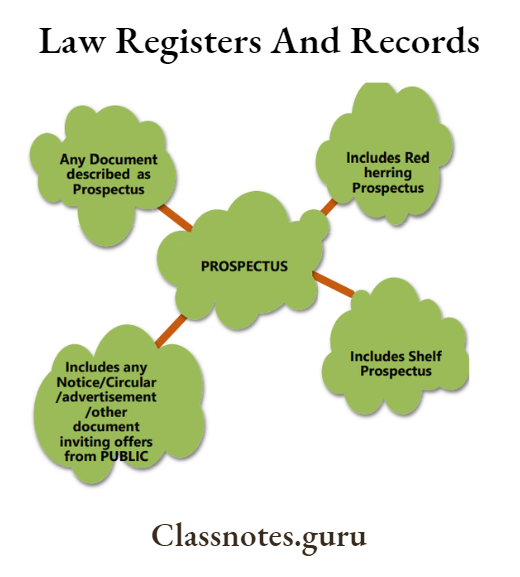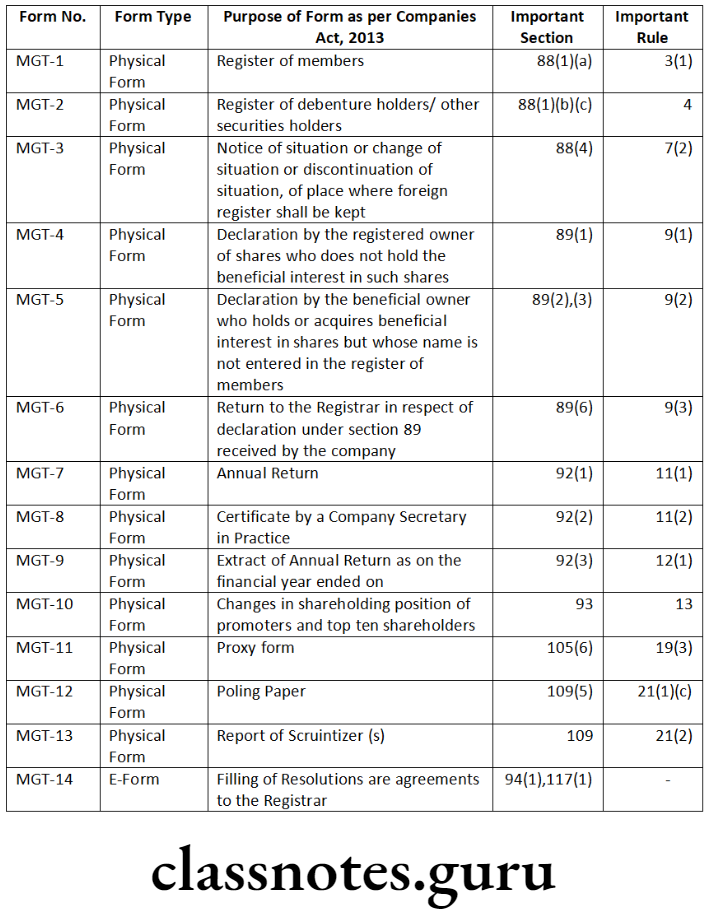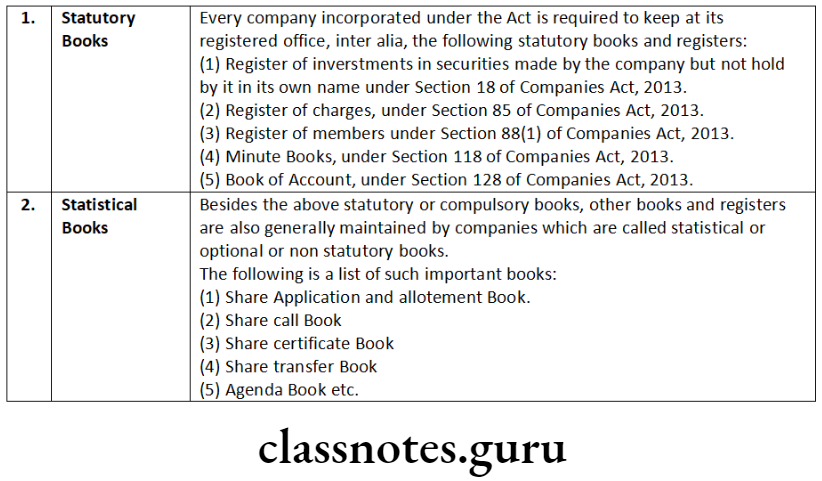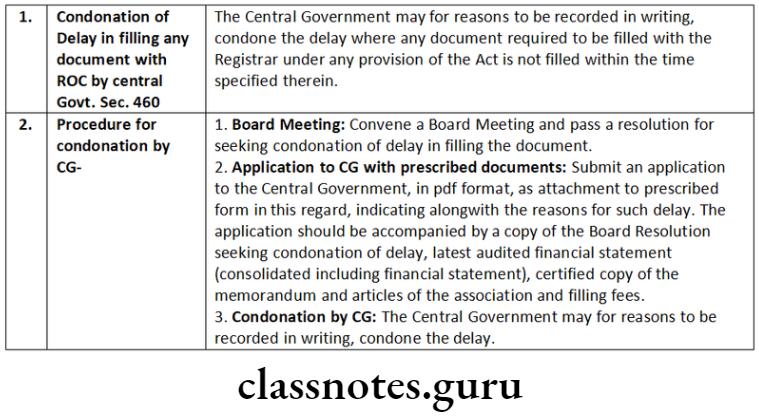Registers And Records Introduction
The Companies Act, 2013 lays down that every company incorporated under this Act must maintain and keep at its registered office certain books, registers and copies of certain returns, documents etc. and to give certain notices, file certain returns, forms, reports, documents etc. with the Registrar of Companies within certain specified time limits and with the prescribed filing fees. These books are known as Statutory Books.
Statutory books and registers
Every company incorporated under the Act is required to keep at its registered office, inter alia, the following statutory books and registers:
- Register of securities bought back. (Section 68 Rule 17(12) of Companies (Share Capital and Debenture) Rules, 2014.
- Register of deposits. [Section 73, Rule 14 Companies (Acceptance of Deposits) Rules, 2014.
- Register of charges (Section 81 Rule 7 of Company’s Registration of Charges, Rules, 2014).
- Register of sweat equity shares [Section 54 and Rule 8 (14) of Companies (Share Capital and Debenture) Rules, 2014]
- Annual Return (Section 92) Rule 11 of The Companies (Management and Administration (Rules 2014)).
- Register of Postal Ballot [Section 110 and Rule 22 of the Companies (Management and Administration) Rules, 2014]
- Books containing minutes of general meeting and of Board and of committees of Directors. [Section 118] Books of Accounts. [Section 128]
- Register of Directors/ key managerial personnel. (Section 170 (1)).
- Register of investments in securities not held in company’s name. [Section 187, Rule 14 of Companies (Meetings and Board Powers) 2014].
- Register of loans, guarantees given and security provided or acquiring securities (Section 186/9 rule 12 Companies Meetings of Boards and its Powers Rules, 2014).
- Register of contracts with companies/firms in which directors are interested. [Section 189(5) Rule 16 of Companies (Meetings of Boards and its Powers) Rules, 2014].

Registers And Records In Company Law
Registers And Records List of Important Forms

Registers And Records Distinguish Between
Question 1. Distinguish between the following:
‘Statutory books’ and ‘statistical books’.
Answer:

Statutory Registers Under Companies Act
Registers And Records Descriptive Questions
Question 2. Chairman of your company wants to know the procedure of condonation of delay by Central Government in filing the document with the Registrar of Companies. As a Company Secretary, prepare a note for consideration of the Chairman.
Answer:

Question 3. Minutes of the meetings of the company shall be preserved for a period of not less than eight years. Comment with reference to the provisions of the Companies Act, 2013.
Answer:
Section 118 of Companies Act, 2013, read with Secretarial Standards on Board Meetings (SS-1) and Secretarial Standards on General Meetings (SS-2), Minutes of all Board Meetings and shareholders meetings shall be preserved permanently in physical or in electronic form with Timestamp. Space to write important points for revision-
Question 4. What are the requirements as to the maintenance of Register of Postal Ballot?
Answer:
Section 110 of the Companies Act, 2013 and Rule 22(10) of the Companies (Management and Administration) Rules, 2014 states that every company which is required to or which proposes to get any resolution passed through postal ballot should maintain a separate register for each postal ballot to record the assent or dissent received through postal ballot.
The scrutinizer shall maintain a register either manually or electronically to record their assent or dissent received, mentioning the particulars of name, address, folio number or client ID of the shareholder, number of shares held by them, nominal value of such shares, whether the shares have differential voting rights, if any, details of postal ballots which are received in defaced or mutilated form and postal ballot forms which are invalid.
Entries in the register should be made immediately after the opening of postal ballots. Separate folios should be maintained for each resolution passed through postal ballot. The register should be kept at the registered office of the company after the Scrutinizer has submitted his report.
The postal ballot and all other papers relating to postal ballot including voting by electronic means, shall be under the safe custody of the scrutinizer till the chairman considers, approves and signs the minutes and thereafter, the scrutinizer shall return the ballot papers and other related papers or register to the company who shall preserve such ballot papers and other related papers or register safely.
Question 5. You are a company secretary in a company. The Board of Directors want to know the details that should be entered in the Register of Renewed and Duplicate share certificates and the period for which such register should be maintained. Clarify the Board in this regard.
Answer:
- In terms of Section 46 of the Companies Act, 2013 read with Rule 6 of the Companies (Share Capital and Debentures) Rules, 2014, every company with a share capital should, from the date of its registration, maintain a register of renewed and duplicate certificates.
- The word ‘renewed’ includes consolidation and sub-division of shares and issue of certificate in lieu thereof.
- Particulars of every share certificate issued shall be recorded in a Register of Renewed and Duplicate Share Certificates. Such register shall be maintained in Form No. SH-2 indicating against the name(s) of the person(s) to whom the certificate is issued, the number and date of issue of the share certificate in lieu of which the new certificate is issued, and the necessary changes indicated in the Register of Members by suitable cross-references in the “Remarks” column. Such register shall be kept at the registered office of the company or at such other place where the Register of Members is kept.
- The register shall be preserved permanently and shall be kept in the custody of the Company Secretary of the company or any other person authorized by the Board for the purpose.
- All entries made in the Register of Renewed and Duplicate Share Certificates shall be authenticated by the company secretary or such other person as may be authorised by the Board for purposes of sealing and signing the share certificate. The register is not open for inspection. -Space to write important points for revision
Types Of Records Maintained By Companies
Question 6. Mention the requirements in relation to maintenance of minutes, as prescribed by the Secretarial Standards Board.
Answer:
Secretarial Standard-2 (SS-2) on “General Meetings”:
- Secretarial Standard-2 (SS-2) on “General Meetings”, is issued by the Council of the Institute of Company Secretaries of India and approved by the Central Government.
- Minutes’ are the official recording of the proceedings of the Meeting and the business transacted at the Meeting. Every company shall keep Minutes of all Meetings. Minutes kept by the provisions of the Act evidence the proceedings recorded therein. Minutes help in understanding the deliberations and decisions taken at the Meeting.
- Minutes of Board Meeting:
- Minutes shall be recorded in books maintained for that purpose.
- A distinct Minutes Book shall be maintained for Meetings of the Members of the company, creditors and others as may be required under the Act.
- A company may maintain its Minutes in physical or electronic form.
- The pages of the Minutes Books shall be consecutively numbered. Minutes shall not be pasted or attached to the Minutes Book, or tampered with in any manner.
- Minutes of Meetings, if maintained in loose-leaf form, shall be bound periodically at least once in every three years.
- Minutes Books shall be kept at the Registered Office of the company.
- Contents of Minutes:
- Minutes shall state, at the beginning the Meeting, name of the company, day, date, venue and time of commencement of the Meeting
- Minutes shall record the names of the Directors and the Company Secretary present at the Meeting
- Minutes shall, inter alia, contain, (a) The Record of election, if any, of the Chairman of the Meeting. (b) The fact that certain registers, documents, the Auditor’s Report and Secretarial Audit Report, as prescribed under the Act were available for inspection. (c) The Record of presence of Quorum. (d) The number of Members present in person including representatives. (e) The number of Proxies and the number of shares represented by them. (f) The presence of the Chairmen of the Audit Committee, Nomination and Remuneration Committee and Stakeholders Relationship Committee or their authorised representatives. (g) The time of commencement and conclusion of the Meeting.
- In respect of Resolutions passed by e-voting or postal ballot, a brief report on the e-voting or postal ballot conducted including the Resolution proposed, the result of the voting thereon and the summary of the scrutiniser’s report shall be recorded in the Minutes Book and signed by the Chairman or in the event of death or inability of the Chairman, by any Director duly authorised by the Board for the purpose, within thirty days from the date of passing of Resolution by e-voting or postal ballot.
- Recording of Minutes:
- Minutes shall contain a fair and correct summary of the proceedings of the Meeting.
- Minutes shall be written in clear, concise and plain language
- Each item of business taken up at the Meeting shall be numbered. Minutes shall be entered in the Minutes Book within thirty days from the date of conclusion of the Meeting
- The date of entry of the Minutes in the Minutes Book shall be recorded by the Company Secretary
- Minutes, once entered in the Minutes Book, shall not be altered Minutes of a General Meeting shall be signed and dated by the Chairman of the Meeting or in the event of death or inability of that Chairman, by any Director who was present in the Meeting and duly authorised by the Board for the purpose, within thirty days of the General Meeting
- The Chairman shall initial each page of the Minutes, sign the last page and append to such signature the date on which and the place where he has signed the Minutes.
Statutory Registers Maintenance In India
- Inspection and Extracts of Minutes:
- Directors and Members are entitled to inspect the Minutes of all General Meetings including Resolutions passed by postal ballot.
- Extract of the Minutes shall be given only after the Minutes have been duly signed. However, any Resolution passed at a Meeting may be issued even pending signing of the Minutes, provided the same is certified by the Chairman or any Director or the Company Secretary.
- Preservation of Minutes and Other Records:
- Minutes of all Meetings shall be preserved permanently in physical or in electronic form with Timestamp
- Office copies of Notices, scrutiniser’s report and related papers shall be preserved in good order in physical or in electronic form for as long as they remain current or for eight financial years, whichever is later and may be destroyed thereafter with the approval of the Board.
- Minutes Books shall be kept in the custody of the Company Secretary.
